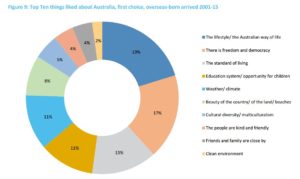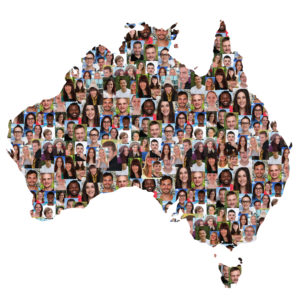Discrimination and exclusion issues for migrants – study finds
Newcomers to Australia cherish our freedom, democracy, and standard of living but some are happier than others and different groups experience varying levels of racism and exclusion, according to a first ever broad survey of the attitudes of recent migrants.
The Scanlon Foundation Australians Today report shows that while Australia is generally considered as a good country for migrants, the findings are not positive across all groups, with some experiencing high levels of dissatisfaction and discrimination.
The report, produced in partnership with Monash University and the Australian Multicultural Foundation, is the largest ever survey of people born in Australia as well as recent migrants, on their experience of Australian life with more than 10,000 respondents completing the survey across 20 languages.
 Humanitarian entrants, while satisfied with life in Australia, struggled to find work and reported increased financial hardship over time, the research found.
Humanitarian entrants, while satisfied with life in Australia, struggled to find work and reported increased financial hardship over time, the research found.
Discrimination remained a serious issue, with highest levels reported by Indigenous Australians and some African national groups.
More than three in four (77 per cent) South Sudanese migrants – a relatively new immigrant group in Australia, arriving largely via the humanitarian program – said they had experienced discrimination. This was the highest level of all respondent groups.
This group also reported significantly higher levels of physical attack, property damage and verbal abuse compared to Australian born residents.
The South Sudanese were also the most distrustful of police and the justice system, the study found.
Negativity towards Muslims is also relatively high in Australia, with Muslim women reporting 50 per cent more experiences of discrimination than Muslim men.
Australians Today author Professor Andrew Markus said the research highlighted the level of polarisation on immigration and cultural diversity.
“The majority of Australians support the immigration program. Some 56 per cent are supportive of the current intake or consider that it could be increased. However, when asked what they least like about Australia, 18 per cent of people born in Australia indicated there was too much immigration,” Prof Markus said.
“Many Australians live in the context of cultural diversity, for them, diversity is the normal way of life. But for others, little has changed since the days of the monocultural society of their parents.
One key finding counters some popular beliefs about Muslims failing to integrate with the rest of society.
The survey found 72 per cent had a “sense of belonging” and 75 per cent were satisfied with their life in Australia.
“The Muslim community is so diverse and when there is public debate there is no recognition of that diversity,” Prof Markus said, referring to recent focus on Muslim Australians by Pauline Hanson and the One Nation Party.
“What we’re doing is alienating significant sections of the Muslim community rather than working with them,” he said.
Earlier Scanlon surveys have shown that 85 per cent of Australians supported multiculturalism.
Prof Markus said issues around migration aroused strong feelings and had the potential to polarise society.
“When we ask people ‘what do you most like or least like about Australia?’ we find that close to 20 per cent of people say ‘too many migrants’ and a similar number say ‘racism and discrimination’. This gives a sense of that division,” he said.
Australia is unquestionably a multicultural nation, with almost half of Australians either born overseas or having a parent born overseas. Australia welcomes 190,000 people a year under the immigration program, with 68 per cent in the skilled stream and, 32 per cent in the family stream. There are another 13,750 humanitarian places for refugees.
The study found the strength of identification with Australia remains at a high level among immigrants. Sixty-four per cent of recent arrivals (who came between 2001‐15) indicated a sense of belonging to a “great” or “moderate extent”, compared to 63 per cent of respondents two years earlier.
And newcomers are optimistic, with only 6 per cent of recent arrivals disagreeing with the statement that “Australia is a land of economic opportunity where in the long run, hard work brings a better life”.
Most happy and prosperous of recent migrants were those arriving in Australia on a 457 Business visa, with 90 per cent satisfied with life in Australia, the study found.
In contrast, many arriving on an Independent Skill visa struggle to find work, and nearly half indicate they are just getting along or struggling to pay bills.
Prof Markus said the difference in satisfaction levels between 457 visa holders and those on Independent Skill visas was significant.
“The proportion of Independent Skill visa holders indicating a measure of difficulty is more than double that of 457 visa holders. A likely explanation is that 457 visa holders have work arranged before they come to Australia,” he said.
 Among those least satisfied are New Zealand Special Category Visa holders, with some 50 per cent indicating that they have experienced racism or discrimination in Australia – the highest level among the visa categories analysed.
Among those least satisfied are New Zealand Special Category Visa holders, with some 50 per cent indicating that they have experienced racism or discrimination in Australia – the highest level among the visa categories analysed.
“New Zealanders are not considered migrants and are not accepted as permanent residents, even though large numbers base their lives in Australia. These visa conditions also contribute to a low sense of belonging in Australia,” Prof Markus said.
“More than a quarter indicated they had no sense of belonging in Australia, compared to 5 per cent from the UK and 1 per cent from India.”
Prof Markus said Australia fared relatively well globally in settling migrants.
“It’s not an inconsiderable contribution in terms of cost to government, given we are taking in people in the first generation who are going to have big difficulties, and maybe second generation as well,” he said.
“Australians tend to react to spectacular injustice. We react to Don Dale but what about asylum seekers? What is going to happen to them? We have a capacity to put it aside.
“Still, it’s not like Australia is doing nothing. It’s actually managing a large resettlement program, given its population and on top of that it has the 12,000 Syrians to take in,” he said.
Scanlon Foundation CEO, Anthea Hancocks said the Australians Today report provided valuable insight for government, business and the community.
“The Australians Today report shows a number of positive indicators relating to life in Australia from various perspectives, including recent arrivals, but it is important that the challenges identified are considered and addressed,” Ms Hancocks said.
The full Australians Today report is available at the Scanlan Foundation’s website here.
Laurie Nowell
AMES Australia Senior Journalist













